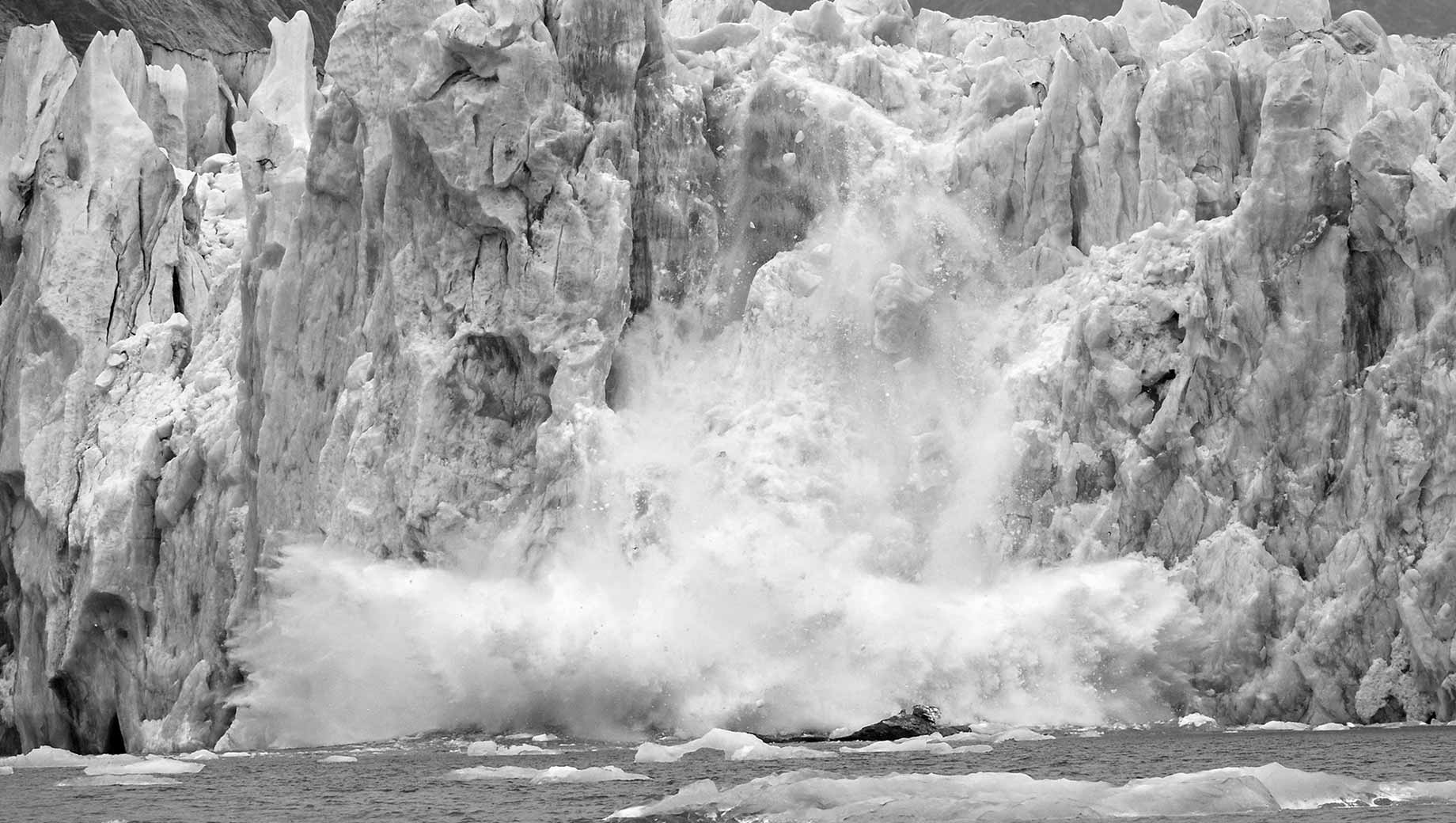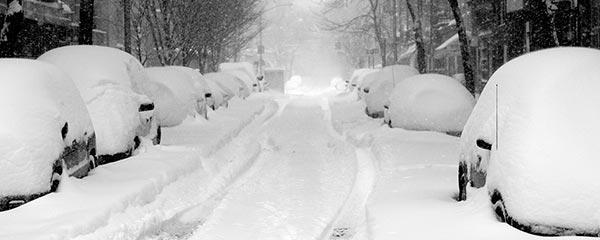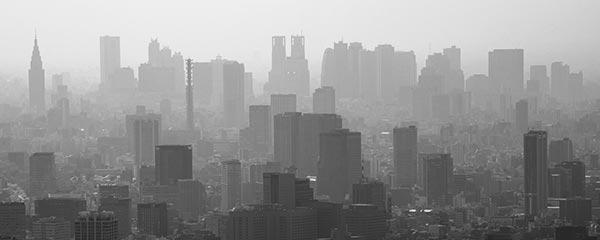Story Highlights
- 66% believe global warming is caused by human activity, near all-time high
- Fewer highly worried about it, though also near high point in ���۴�ýtrend
- Partisan differences still stark, with most Democrats worried, most in GOP not
WASHINGTON, D.C. -- Americans' views about global warming have held steady in the past year near the high points reached in 2017 and 2018. Currently, about two-thirds acknowledge in various ways that global warming is a real problem. At the same time, less than half express intense concern about the issue, although concern has been higher from 2016 through 2018 than it was previously.
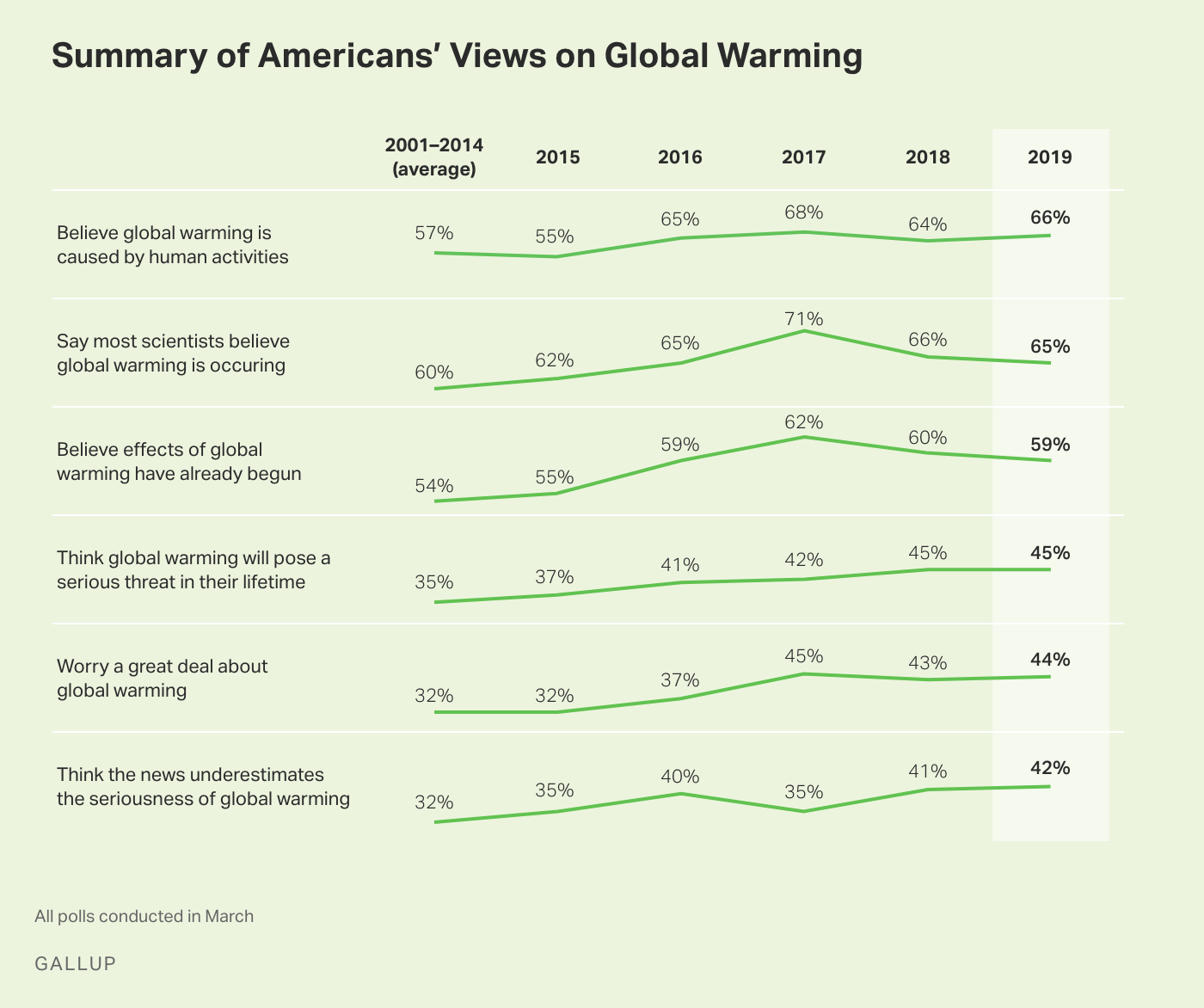
At the high end of the range of global warming consciousness, 66% of U.S. adults say they believe global warming is caused by pollution from human activities rather than natural changes in the environment. Similarly, 65% perceive that most scientists believe global warming is occurring, and 59% believe the effects of global warming have already begun, while another 13% believe they will happen within their lifetime.
Despite these views, fewer than half of Americans -- 45% -- think global warming will pose a serious threat in their own lifetime and 44% say they worry a great deal about it. Another 21% worry a fair amount about global warming, while about a third (35%) worry only a little or not at all.
Just over four in 10, 42%, think the news underestimates the seriousness of global warming, while 22% think the news gets it about right and 35% think it exaggerates the problem.
These findings are based on Gallup's 2019 update of its annual Environment poll, conducted March 1-10. Full trends for these six global warming perceptions are available through a link at the end of this article.
Majority of Americans for First Time Are "Concerned Believers"
���۴�ýtakes these data a step further by classifying Americans into attitudinal types based on four of the global warming questions. The analysis puts Americans into three main groups:
-
"Concerned Believers" are highly worried about global warming, think it will pose a serious threat in their lifetime, believe it's the result of human activity, and think news reports about it are accurate or underestimate the problem.
-
"Cool Skeptics" hold the opposing views on the same four questions: They worry little or not at all about global warming, do not think it will pose a serious threat in their lifetime, think it's attributable to natural environmental changes and think the news exaggerates the problem.
-
Those in the "Mixed Middle" hold a combination of views. For instance, some believe global warming is caused by humans but aren't worried about it, while others express the reverse perspective -- saying warming is a natural phenomenon, but they are highly worried about it.
For the first time since 2001, a majority of Americans are classified as Concerned Believers. The 51% categorized as such this year is statistically similar to the 47% to 50% recorded in each of the prior three years, from 2016 to 2018, but is up significantly over all years before that. Meanwhile, the percentage of Cool Skeptics is flat near 20%, and 30% are in the Mixed Middle, down from 37% in 2015.
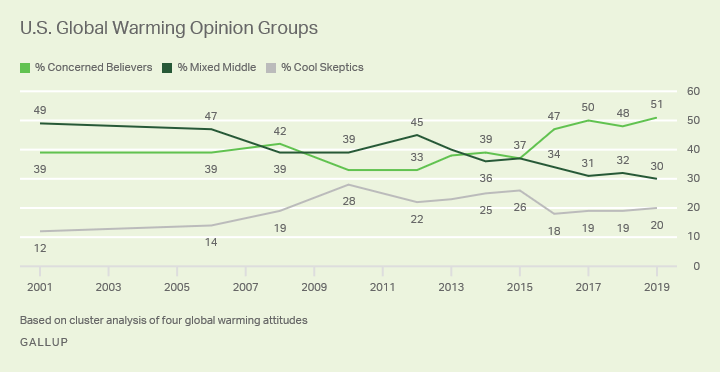
Democrats More Uniform Than Republicans in Global Warming Outlook
The proportion of Americans falling into each of Gallup's global warming types differs widely by demographic subgroup, including by age, education, race and gender.
Bigger differences are seen by party and political ideology. Most Democrats (77%) are classified as Concerned Believers, while half of Republicans (52%) are Cool Skeptics. Notably, virtually all Democrats who aren't Concerned Believers fall into the Mixed Middle category. By contrast, nonskeptical Republicans on the global warming spectrum are more divided. Overall, 16% of Republicans are Concerned Believers and 32% are the Mixed Middle.
At 81%, self-described liberals are the most likely group to be classified as Concerned Believers. A majority of moderates fit this description, while conservatives are split. The plurality of conservatives are Cool Skeptics, but a full quarter are Concerned Believers.
| Concerned Believers | Mixed Middle | Cool Skeptics | |||||||||||||||||||||||||||||||||||||||||||||||||||||||||||||||||||||||||||||||||||||||||||||||||
|---|---|---|---|---|---|---|---|---|---|---|---|---|---|---|---|---|---|---|---|---|---|---|---|---|---|---|---|---|---|---|---|---|---|---|---|---|---|---|---|---|---|---|---|---|---|---|---|---|---|---|---|---|---|---|---|---|---|---|---|---|---|---|---|---|---|---|---|---|---|---|---|---|---|---|---|---|---|---|---|---|---|---|---|---|---|---|---|---|---|---|---|---|---|---|---|---|---|---|---|
| % | % | % | |||||||||||||||||||||||||||||||||||||||||||||||||||||||||||||||||||||||||||||||||||||||||||||||||
| Men | 46 | 29 | 25 | ||||||||||||||||||||||||||||||||||||||||||||||||||||||||||||||||||||||||||||||||||||||||||||||||
| Women | 55 | 30 | 14 | ||||||||||||||||||||||||||||||||||||||||||||||||||||||||||||||||||||||||||||||||||||||||||||||||
| 18 to 29 | 67 | 26 | 7 | ||||||||||||||||||||||||||||||||||||||||||||||||||||||||||||||||||||||||||||||||||||||||||||||||
| 30 to 49 | 49 | 30 | 21 | ||||||||||||||||||||||||||||||||||||||||||||||||||||||||||||||||||||||||||||||||||||||||||||||||
| 50 to 64 | 43 | 31 | 26 | ||||||||||||||||||||||||||||||||||||||||||||||||||||||||||||||||||||||||||||||||||||||||||||||||
| 65 and older | 47 | 31 | 22 | ||||||||||||||||||||||||||||||||||||||||||||||||||||||||||||||||||||||||||||||||||||||||||||||||
| Postgraduate | 58 | 24 | 18 | ||||||||||||||||||||||||||||||||||||||||||||||||||||||||||||||||||||||||||||||||||||||||||||||||
| College graduate only | 60 | 20 | 20 | ||||||||||||||||||||||||||||||||||||||||||||||||||||||||||||||||||||||||||||||||||||||||||||||||
| Some college | 51 | 27 | 22 | ||||||||||||||||||||||||||||||||||||||||||||||||||||||||||||||||||||||||||||||||||||||||||||||||
| No college | 43 | 39 | 18 | ||||||||||||||||||||||||||||||||||||||||||||||||||||||||||||||||||||||||||||||||||||||||||||||||
| Non-Hispanic white | 46 | 27 | 27 | ||||||||||||||||||||||||||||||||||||||||||||||||||||||||||||||||||||||||||||||||||||||||||||||||
| Nonwhite | 60 | 35 | 5 | ||||||||||||||||||||||||||||||||||||||||||||||||||||||||||||||||||||||||||||||||||||||||||||||||
| Democrats | 77 | 22 | * | ||||||||||||||||||||||||||||||||||||||||||||||||||||||||||||||||||||||||||||||||||||||||||||||||
| Independents | 53 | 33 | 14 | ||||||||||||||||||||||||||||||||||||||||||||||||||||||||||||||||||||||||||||||||||||||||||||||||
| Republicans | 16 | 32 | 52 | ||||||||||||||||||||||||||||||||||||||||||||||||||||||||||||||||||||||||||||||||||||||||||||||||
| Liberals | 81 | 18 | 1 | ||||||||||||||||||||||||||||||||||||||||||||||||||||||||||||||||||||||||||||||||||||||||||||||||
| Moderates | 56 | 33 | 11 | ||||||||||||||||||||||||||||||||||||||||||||||||||||||||||||||||||||||||||||||||||||||||||||||||
| Conservatives | 25 | 35 | 41 | ||||||||||||||||||||||||||||||||||||||||||||||||||||||||||||||||||||||||||||||||||||||||||||||||
| Based on cluster analysis of four global warming attitudes; * Less than 0.5% | |||||||||||||||||||||||||||||||||||||||||||||||||||||||||||||||||||||||||||||||||||||||||||||||||||
| Gallup, March 1-10, 2019 | |||||||||||||||||||||||||||||||||||||||||||||||||||||||||||||||||||||||||||||||||||||||||||||||||||
In terms of demographic differences, there is a 20-percentage-point spread between the youngest and oldest Americans in those classified as Concerned Believers: 67% of those 18 to 29 vs. 47% of those 65 and older. Additionally, only 7% of young adults meet the definition of Cool Skeptics, compared with 22% of seniors.
There is a 15-point spread in Concerned Believers by education: 58% of postgraduates vs. 43% of adults with no college experience. And conforming with the more Democratic orientation of women and nonwhite Americans, both of these groups are more likely than their counterparts to be Concerned Believers.
Bottom Line
At the end of a winter when a large segment of Americans perceive temperatures in their area to have been colder than normal, the public's concern about global warming and belief that humans are responsible are holding steady at or near the trend high points. While Americans as a whole are concerned about global warming, the partisan differences between Democrats and Republicans are stark. Most Democrats take the issue seriously and are troubled by it. Republicans remain skeptical and largely unconcerned.
Future ���۴�ýanalysis will explore the relationship between yearly winter temperatures and public attitudes about global warming as measured in Gallup's annual March Environment survey.
View complete question responses and trends.
Learn more about how the works.
